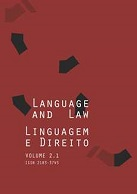Lay litigation behaviour in postcolonial Hong Kong courtrooms
Abstract
Many jurisdictions have recently experienced a significant increase in the number of litigants in person (LiPs) in their civil justice systems; related research
(e.g. Baldacci, 2006; Moorhead, 2007; Richardson et al., 2012; Zuckerman,
2014) has assessed the impact of this on the legal system. In postcolonial Hong
Kong, implementation of legal bilingualism (as a result of which ordinary itizens
may use their local language, Cantonese, to litigate) and the changing political
environment following the 1997 transfer of sovereignty, have also led to a surge
in unrepresented litigation. Drawing on both observation data collected in Hong
Kong courtrooms and interviews with litigants, this interdisciplinary study explores how LiPs in Hong Kong engage, and struggle, with the justice system, and how changing patterns of interaction in these courtrooms reflect a postcolonial legality. It illustrates the strategies LiPs adopt in presenting their case, which are not displayed by represented litigants or professional advocates, and explains their behaviour in linguistic and sociocultural terms. It is argued that the communication gap between laypersons and legal professionals is ideological and structural, and cannot be bridged simply by adopting present approaches to either assisting or educating the former.
Downloads
Published
How to Cite
Issue
Section
License
Este trabalho está licenciado com uma Licença Creative Commons - Atribuição-NãoComercial 4.0 Internacional.






